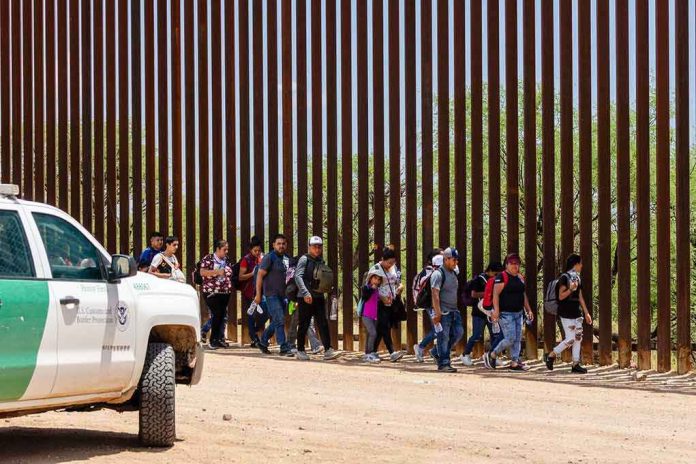
As President Trump’s administration revives border wall construction in Laredo, Texas, local leaders and residents are sounding alarms over what many view as federal overreach threatening property rights, economic vitality, and the very fabric of their community.
Story Snapshot
- Trump administration’s “smart wall” plans advance in Laredo, facing fierce local backlash.
- Laredo’s unique status as a trade hub and safe city now challenged by new federal mandates.
- Federal agencies push forward despite concerns over eminent domain, water supply, and city aesthetics.
- Legal battles and community mobilization intensify as city officials prepare to defend local interests.
Trump’s Renewed Border Wall Push Faces Local Resistance in Laredo
The Department of Homeland Security has officially notified Laredo officials that construction of a new “smart wall” will soon cut through the city, reviving plans from President Trump’s first term. The smart wall, blending steel barriers with advanced surveillance, marks a sharp return to conservative priorities after years of border security neglect under the prior administration.
Federal determination to proceed has triggered immediate resistance from Laredo’s city council, residents, and trade leaders who argue the wall is unnecessary and disruptive for one of Texas’s safest and most commercially vital cities.
Many Laredo residents express deep frustration at what they see as a top-down imposition that disregards local realities. Laredo’s economy relies heavily on cross-border trade, with billions in goods moving daily through its international bridges. Critics of the wall contend that not only will construction risk damaging this lifeline, but it also threatens the city’s close-knit culture and the Rio Grande, Laredo’s sole water source.
Federal claims of increased security are questioned by local law enforcement, who point out that Laredo’s crime rates are among the lowest along the border, achieved without a barrier. City leaders warn that the wall could permanently scar the riverfront and disrupt the delicate balance between commerce and community life.
Federal Authority and Local Rights: Eminent Domain and Legal Showdown
The federal government wields significant power through eminent domain, allowing it to seize private property for national projects. In Laredo, however, city officials and property owners are mobilizing to challenge this authority. Legal teams are collecting evidence and preparing to fight for property rights, river access, and environmental protections.
Previous wall expansions in Texas border counties sparked similar disputes, but Laredo’s economic importance and unique cultural ties to Mexico amplify the stakes. Local businesses reliant on cross-border movement fear disruptions, while environmental groups warn of lasting harm to the Rio Grande ecosystem.
The city council has scheduled public meetings and blueprint reviews to inform and rally the community, setting the stage for a legal and public relations battle that could shape the outcome.
Federal contracts totaling $4.5 billion have already been issued for the broader wall project, even though Laredo’s section remains in the planning phase. This proactive spending underscores the administration’s commitment to border security and technological modernization, but it also deepens local skepticism about whether community voices will truly influence the process.
As legal and political tensions rise, Laredo’s leaders emphasize the need for local input and constitutional protections, framing the fight as one over both property rights and the limits of federal power.
Economic and Social Impacts: Trade, Culture, and Community at Risk
Laredo’s position as a major trade hub makes it particularly vulnerable to disruptions from wall construction. Local businesses, from logistics companies to small retailers, depend on the free flow of goods and people across the border. Any interruption could have ripple effects throughout the region’s economy.
Socially, the wall threatens to divide families and communities accustomed to daily cross-border interaction. City officials and residents argue that the proposed barrier undermines the very values—prosperity, family ties, and local autonomy—that have made Laredo resilient. With the wall’s footprint still under review, the coming months will test whether federal planners are willing to compromise with local stakeholders or press forward regardless of community costs.
Broader Conservative Perspective: Border Security vs. Federal Overreach
For many conservatives, the Trump administration’s push to secure the border represents a long-overdue correction after years of lax policy and unchecked illegal immigration. The integration of advanced surveillance with physical barriers reflects a commitment to modernizing national security while addressing cartel activity and smuggling.
However, the situation in Laredo also raises fundamental questions about federalism, property rights, and the proper scope of government. Defending the border should not come at the expense of constitutional protections or local prosperity.
As the debate intensifies, conservatives nationwide will watch closely to see if the administration can balance robust security with respect for the rights and livelihoods of American citizens on the front lines.
Ultimately, Laredo’s struggle encapsulates a central challenge for the Trump era: how to pursue strong, effective border security while honoring the principles of limited government and individual liberty. The outcome will have implications not only for Texas but for border communities and constitutionalists across the country.
Sources:
Federal government revives plans for Laredo border wall, sparking local resistance
Border Watch: Federal smart wall plans for Laredo and Texas push to find cartel tunnels
Texas Border Wall Construction Status – Texas Facilities Commission
Laredo border wall framework stirs legal, environmental concerns





